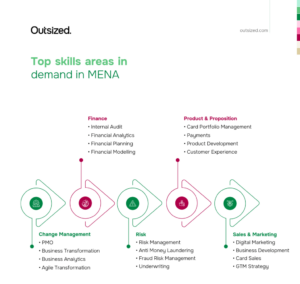The freelance economy in the MENA region is experiencing remarkable growth, with a staggering 142% increase in freelancer registrations since 2022, as per the findings of the Talent-On-Demand 2024 report. Conducted by Outsized, a platform for on-demand talent in the Middle East, Asia-Pacific, and Africa, the report draws insights from proprietary data gathered directly from the platform.
The surge in demand for independent skilled talent within the MENA region reflects a shift towards more agile and flexible workforce models by enterprises. This trend is attributed to the region’s strategic focus on diversifying its economy away from oil dependency towards knowledge and skills-based sectors, prompting increased hiring of freelance talent—a deviation from the global downturn observed in the US and Europe.
Various sectors such as IT, banking, finance, real estate, construction, energy, and hospitality are witnessing a significant rise in independent hiring, indicating a dynamic employment landscape for skilled professionals. Azeem Zainulbhai, Co-founder and Chief Product Officer at Outsized, notes that this shift dispels the misconception that the gig economy is solely for low-skill or low-value talent, signalling a strategic shift towards a data-informed and technology-focused business environment.
Emerging macro trends such as Environmental Social Governance (ESG) and sustainability, data analytics, and procurement are expected to drive the demand for both local and international skilled independent talent in the MENA region. Major projects like NEOM in KSA and open immigration policies in countries like the UAE contribute to the increased demand for skilled freelance labour.

Unlike the global trend dominated by technology and data analysis, the MENA region exhibits a broader scope, encompassing finance, risk, and areas such as product and proposition, sales, marketing, and change management. The report highlights that the on-demand talent pool in the MENA region boasts the highest average expertise, surpassing larger regions like APAC and Africa.
Despite these opportunities, companies in the MENA region face challenges such as a lack of specialised expertise and constraints of conventional hiring methods. The technology sector, in particular, grapples with capacity shortages, prompting investments in retraining and upskilling efforts.
To navigate these challenges and capitalise on emerging opportunities, the report suggests that companies in the MENA region should adopt a holistic strategy for hiring agile talent. This strategy involves not only engaging independent professionals for specific projects but also integrating them actively into their workflows, recognising them as a scalable competitive asset. As the region undergoes digital transformation, embracing agile work models becomes crucial to seize burgeoning opportunities.





